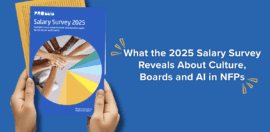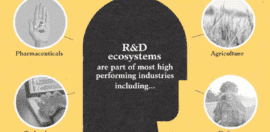‘The new media bargaining code could herald the death of many smaller voices’

3 March 2021 at 4:59 pm
Pro Bono Australia founder and CEO Karen Mahlab AM explains why she is concerned the newly-introduced media bargaining code is a loss for smaller media, could stifle innovation, and even impact democracy.
Once again the big media boys win. And I’m upset. As the founder of a small media company, the co-founder of the Public Interest Journalism Initiative, and co-founder of startup PS Media, I am worried that the newly-introduced media bargaining code, now law, and announcement of big media player agreements with Facebook and Google will hang us small and innovative publishers out to dry. Democracy will suffer, the community will suffer, and innovation will suffer.
Pro Bono Australia was established 20 years ago to give voice to Australia’s social sector. It has been a hard road; after all, it took courage to establish a media company in a declining and fast changing commercial environment for a sector that is generally strapped for cash and can’t pay.
Still, we established Pro Bono Australia idealistically, believing that this sector – its quirks, stories, issues and developments – needed a voice, someone to surface and champion the often unheard and unrepresented opinions of social sector organisations.
Over many years we built a small media organisation employing professional journalists. We have become an important hub with close to two million people visiting our website annually, and we have developed diverse revenue streams that usually mean we break even.
Yes, Pro Bono Australia has been a labour of love. But it was also prescient in its positioning, reporting on the now burgeoning “for purpose” movement and the growth of Australia’s social economy.
In 2016 a problematic C-suite appointment nearly sent us down the gurgler. At that point we realised that if Pro Bono Australia disappeared, so too would an important voice for Australia’s social sector.
Then came the growing realisation that in fact many voices were disappearing; this was happening right across the media sector as the “rivers of gold” that flowed from classified ads – historically providing the dollars that enabled news organisations to pay for journalists – had moved to emerging online platforms such as Seek, Real Estate Australia, CarSales and many others.
Many media organisations were dependent on classified advertising and their response to the shrinking commercial revenue was to employ less journalists: leading to a rapid decline in the number of journalists writing for media and a significant reduction in the breadth of subjects covered, with less voices represented.
Less local, less rural and regional, less courts, less councils, less arts and cultural reporting, and an increased concentration of news generated from content hubs in major cities. (This has been accelerated during COVID, especially at a local level with 160-plus local papers folding.
So in 2018, I and a few others worked to establish the Public Interest Journalism Initiative (PIJI), a not for profit whose mission is “to ensure a robust and sustainable eco-system of public interest journalism in Australia”. In 2019 we appointed ex Australian Competition and Consumer Commission (ACCC) boss Allan Fels AO as chair.
When late last year the Treasurer Josh Frydenberg asked the ACCC to develop a mandatory code of conduct to address bargaining power imbalances between Australian news media businesses and digital platforms, PIJI took a very active role in convening media, research and making submissions to government, along with many other interested parties.
Needless to say that while I recused myself (as a media owner) from PIJIs policy committee, I feel as though I have been in the thick of developments between Facebook, Google and the Australian government.
I do not speak for PIJI here, but in my view the results of the ACCCs media bargaining code, now voted in as law, could quite dramatically increase the concentration of Australian media ownership, already one of the most concentrated markets in the world. Small, independent and niche publishers do not have the means or the avenues to negotiate with Facebook or Google in the same way as we’ve seen the bigger media players operate in recent weeks.
Facebook’s threat of the nuclear option saw amendments to the bill introduced that allow the platforms to decide who they will fund. Furthermore the new code does not cater in any way to support innovation, or emergent media players like our new local media startup, PS Media.
The upshot is that we will only ever get what we’ve had, which is not enough, and Australian news consumers are denied a path into what could be a very exciting future. This is a massive opportunity lost.
Unless alternative government mechanisms – such as the establishment of a multi-million dollar granting body for media or the development of tax incentives – are subsequently introduced, there is a danger that the code could herald the death of many smaller voices. More government action is required to help smaller publishers and media innovation thrive.








